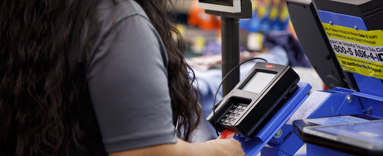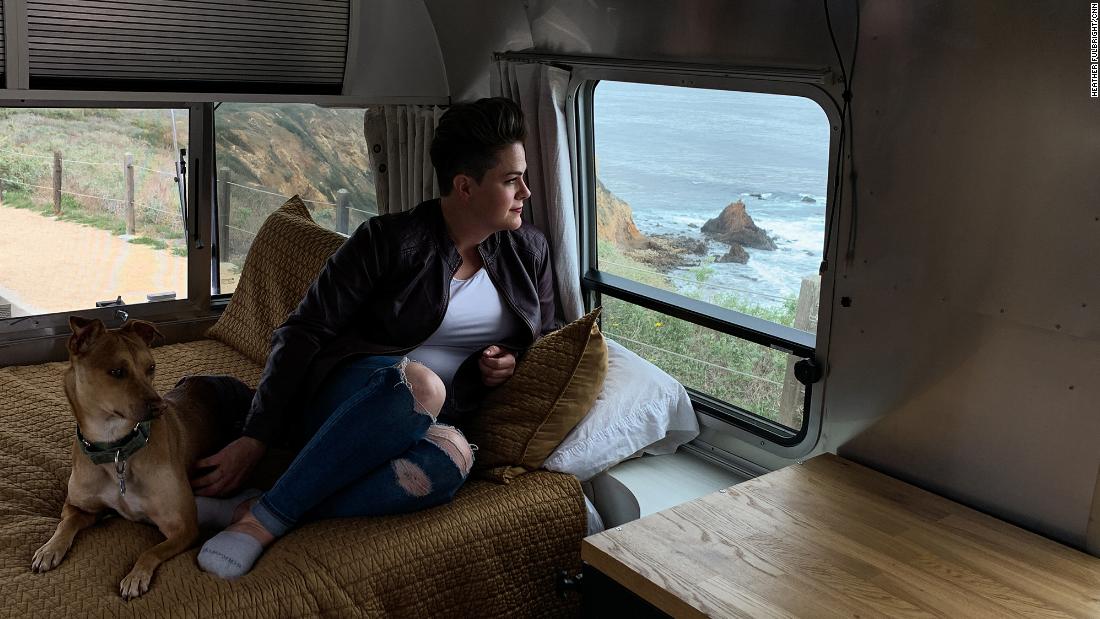It's been one year since Covid-19 was declared a pandemic and businesses started closing. CNN Business looks back on the pandemic's impact on the global workforce and how things may have forever changed.
It's been a year since companies across the globe sent employees home to work as the pandemic spread.
While many businesses were forced to shut down permanently, remote work enabled others to survive, and even thrive in some cases. As a result, many employers have decided to offer more flexibility when it comes to where and when their employees work.
Andrew Hewitt, a senior analyst at market research firm Forrester, expects about 60% of companies to offer a hybrid work model, while 10% will be fully remote.
And while working from home comes with its fair share of challenges, it's also provided some workers the opportunity to make some life-changing decisions.
Some have taken to the road, while others have strengthened new relationships and changed their approach to how they work. This is how the pandemic has changed the way these workers live and work.
Rolling in an Airstream
Nicole Maddox accepted her job at cryptocurrency exchange Coinbase less than a week before San Francisco went under shelter-in-place orders in March 2020.
She hasn't met most of her team in person, and has never worked in the company's San Francisco offices. But she's been able to work from different places around the country out of her 22-foot Airstream trailer.
Maddox bought the Airstream in 2019, and retrofitted it to add space for her to work, taking out the U-shaped dinette to make room for more storage and a desk.
Previously, Maddox picked places to live based on career opportunities, which usually limited her to major metropolitan areas. But now that she can be remote, she has more options.
"I don't have to choose between lifestyle and career," said Maddox. "I get to do both now. With the Airstream, I have the flexibility I can come back to spend a month in San Francisco with my team and then keep traveling. It's really unlocked the lifestyle I want to have. I can have my cake and eat it, too."
Forging deeper connections
Talat Mangla used to travel about two to three days every other week for her job as a director in the assurance practice at PwC.
But all of that came to a halt last March, and she's been working full-time at home ever since.
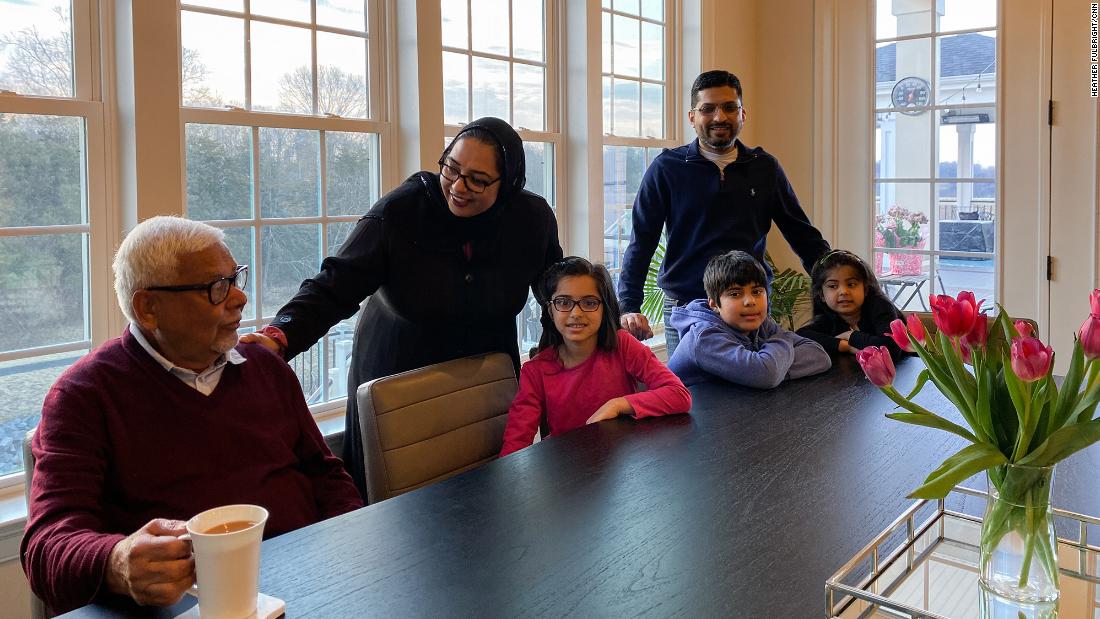
While Mangla worked from home when she wasn't on the road before the pandemic, now she's joined by her husband, her parents and three children, who are 5, 6 and 8 years old. The adjustment to working in a full house was tough at first -- especially when it came to figuring out a routine for the kids.
"In March and April, the kids didn't have structured remote learning," said Mangla. "It was literally almost this anguish to figure out in the afternoon, 'What am I going to do with these guys while I try to get work done?' You almost felt like an activities director."
But as time went on, the family adjusted and bonds strengthened. They've had Scrabble and Monopoly nights, watch the news after dinner together, and there's often a puzzle on the dining room table.
"[The kids] each have their thing that they do with their grandparents," she said. Mangla's dad handles breakfast and learned everyone's preferences: who likes what on their bagels and how they like their eggs. And being a retired professor, he'll check-in on homework. Her mom taught the kids how to make paratha, a flatbread, and there are plans to plant flowers this Spring.
Living in paradise
Some mornings, Alan Gilchrest gets to swim with sea turtles.
When the pandemic first hit in March, Gilchrest, a senior vice president at conversational AI company LivePerson, left Bellevue, Washington, for his vacation home in Hawaii.
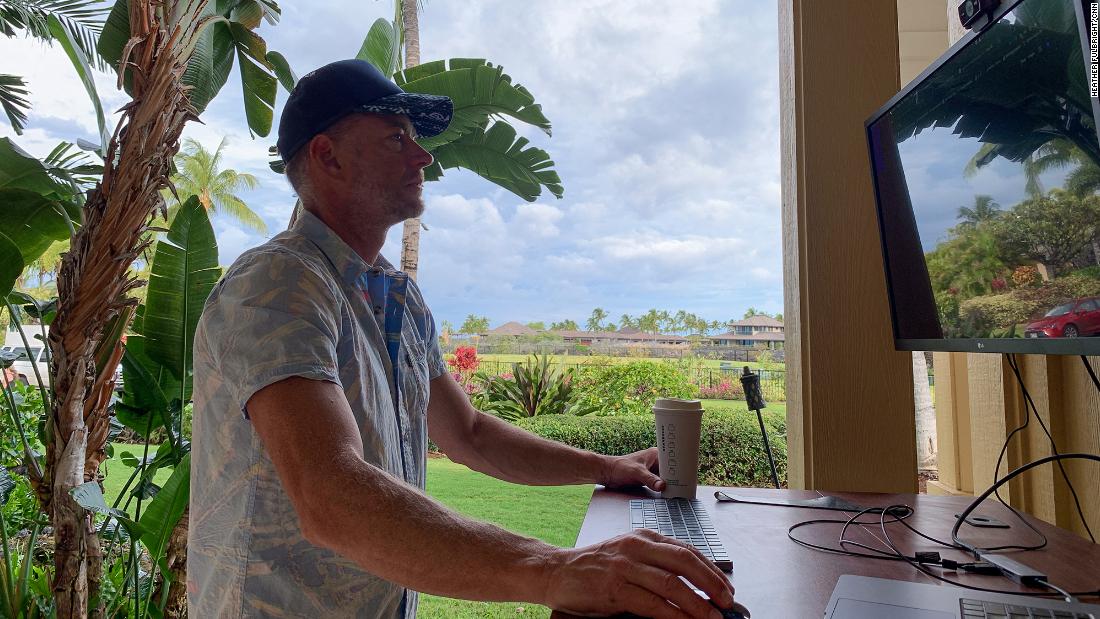
"Not having to run to soccer practice after school or me traveling for work -- the benefits of this time together I don't think can be [overstated]." she said.
"I thought it was going to be a few weeks or months... I found I was able to start working here and maintain a normal schedule." When the company announced last summer that it would become an "employee-centric" workforce, allowing employees to work from anywhere, Gilchrest decided to stay in Hawaii.
He and his wife had planned to eventually retire to Hawaii, but now they're planning to sell their home in Bellevue.
Gilchrest keeps his schedule on East Coast time, which means getting up around 4:00 to 4:30 am, but his workday generally ends around 2:30 pm, which gives plenty of time for outdoor activities including surfing, swimming and paddle boarding.
His home office is set up on the patio outside his bedroom, complete with a desk, monitors, and, of course, palm trees and the ocean as a backdrop. "I can walk out to my bay outside of here and do open water swimming with the turtles in the morning. That is a pretty good break in the morning routine."
Stroller walks and lunchtime peek-a-boo
2020 brought two major life events for Sam Bright: he became a first-time dad and he started a new job. Bright joined freelance marketplace Upwork as chief product and experience officer in November.
The company had gone remote due to the pandemic and by May, decided that it would go "remote-first." So interviewing for the position and meeting his team happened virtually. His laptop came in the mail.
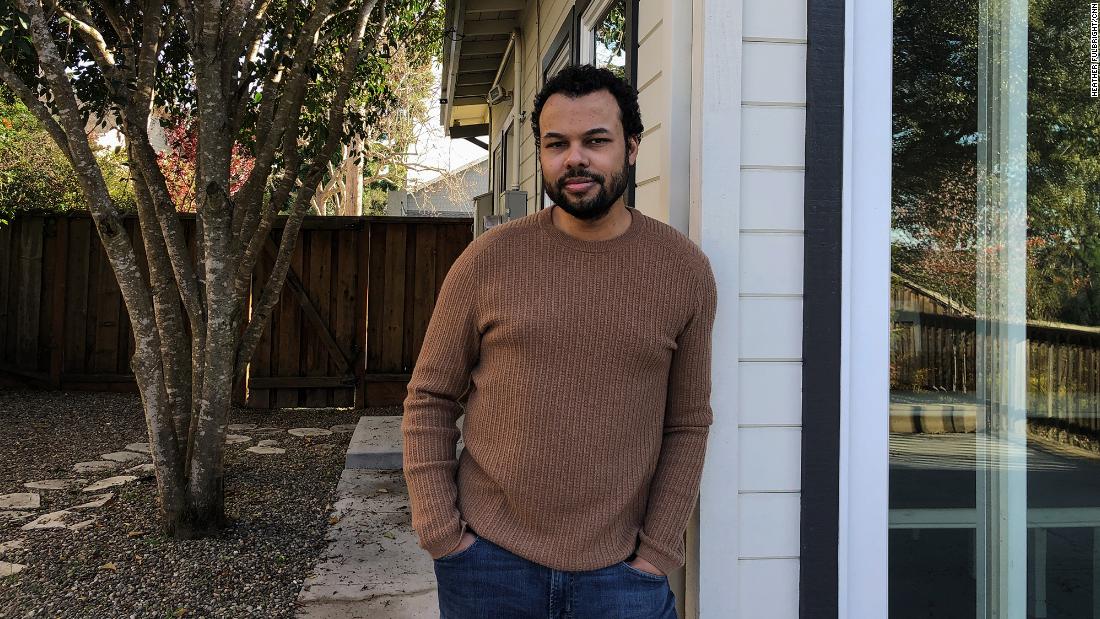
"You find additional ways to connect in this new paradigm," he said.
To help, Bright wrote a manual on how he likes to work with a team and reviewed other employees' manuals to learn how to best partner with them. He started holding virtual office hours that are open to everyone on his team and coffee chats with his leadership colleagues.
He also began writing weekly Slack posts that include things like customer feedback, company updates and recognition of team members, as well as some personal touches, like what he did over the weekend.
"Part of building trust and building a great culture is enabling the holistic self both of a leader and also their team to truly emerge, and technology has a role in that," Bright said.
Working from home means Bright gets to spend more time with his infant son.
"Not having to do a commute means that it's easier for me to go on a stroller walk around the neighborhood before it gets dark. It's easier for me during lunch time to play peek-a-boo with my son," he said. "There is a different way for me enjoy work-life balance in ways I wasn't fully able to before."
Hitting the open road
Erin Brady initially laughed off her colleague's suggestion last June that she buy an RV and travel across the country. But the more she thought about it, the more it made sense.
By August, she had sold or donated most of her possessions and had hit the road. Now she is living in a 400-square-foot RV.
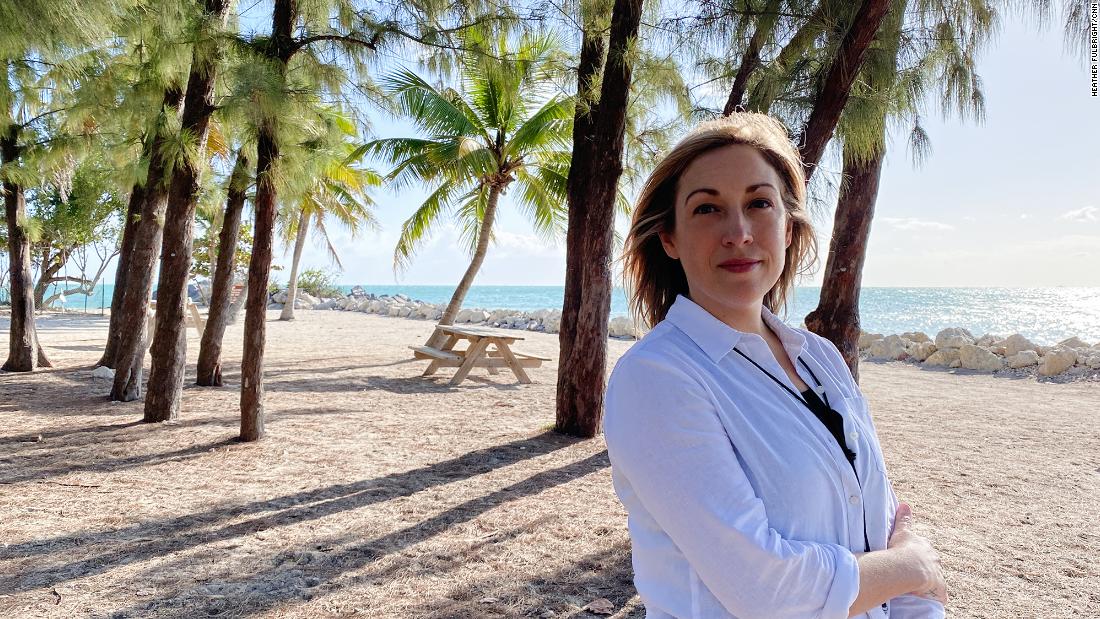
"I was worried it would be lonely working alone, being in the house so much. This has really opened up things for me," said Brady, who is senior lead counsel at Zillow.
To make sure she's always able to work no matter where she is, Brady has cellular service from two major providers and multiple mobile hot spots. She only travels on the weekends and works in her kitchen or living area, or outside when she can.
She's been all across the country, including the Oregon coast, the Grand Canyon, the coast of Maine, Texas and Florida.
One of her favorite spots so far has been Arches National Park in Utah. "There were a lot of thunderstorms happening, it would be blazing hot and sunny, and then there would just be these thunderstorms that would roll in. I saw a rainbow almost every day."
Enhancing communication
As CEO of live auction site Tophatter, the last 12 months have reinforced the importance of communication to Ashvin Kumar.
The company has been remote since March and Kumar plans to offer employees flexibility on where they work post-pandemic.
Since the pandemic began, the company has relied more on asynchronous communication tools, like Slack and Notion, and has also changed its approach to meetings.
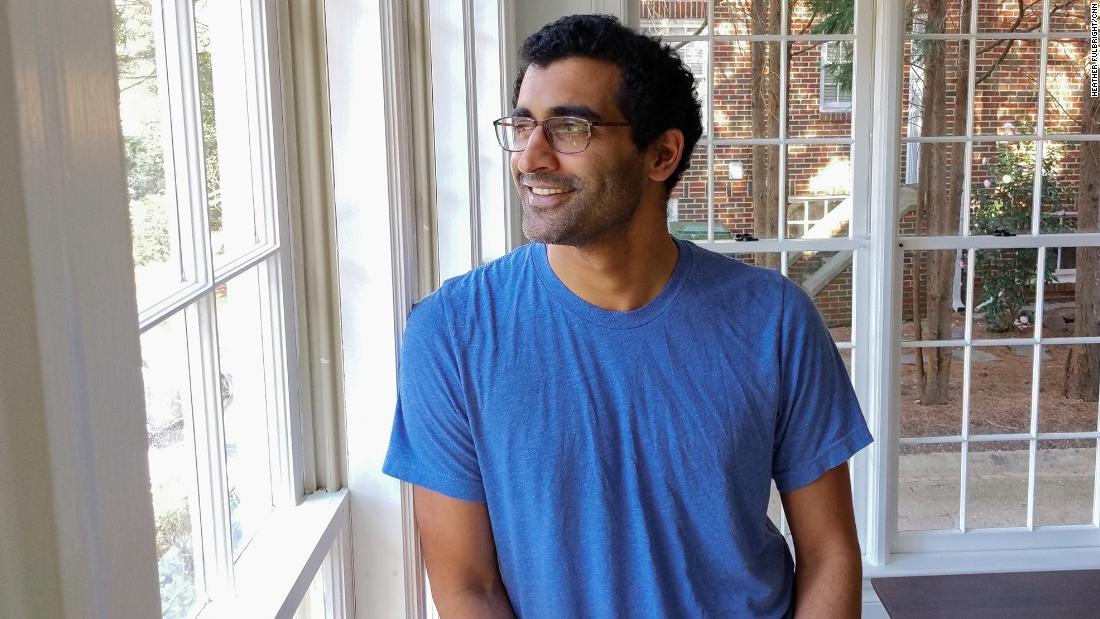
Group decision-making meetings are encouraged to be open -- meaning they are put on an open calendar that every employee can see and be part of if they choose. The meetings are also recorded.
"I get to hear people in a way I wouldn't otherwise be able to, that is special, it feels more inclusive and feels like we've democratized decision making a little."
Not traveling for work has also allowed Kumar to spend more time with his three kids, ages 6, 3, and six months.
"I see a whole new side of them by being around for the whole day. It's been special being able to be there for the small moments," he said. "All the in between hours and the dead spaces between meetings I can step out of my office and see what they are up to."
Achieving a life goal
Nina Anziska always wanted to move to Los Angeles.
"It was a life goal. I thought I would do it when I had kids and a family one day. It was always in the back of my mind," said Anziska, who works for learning platform Skillshare.
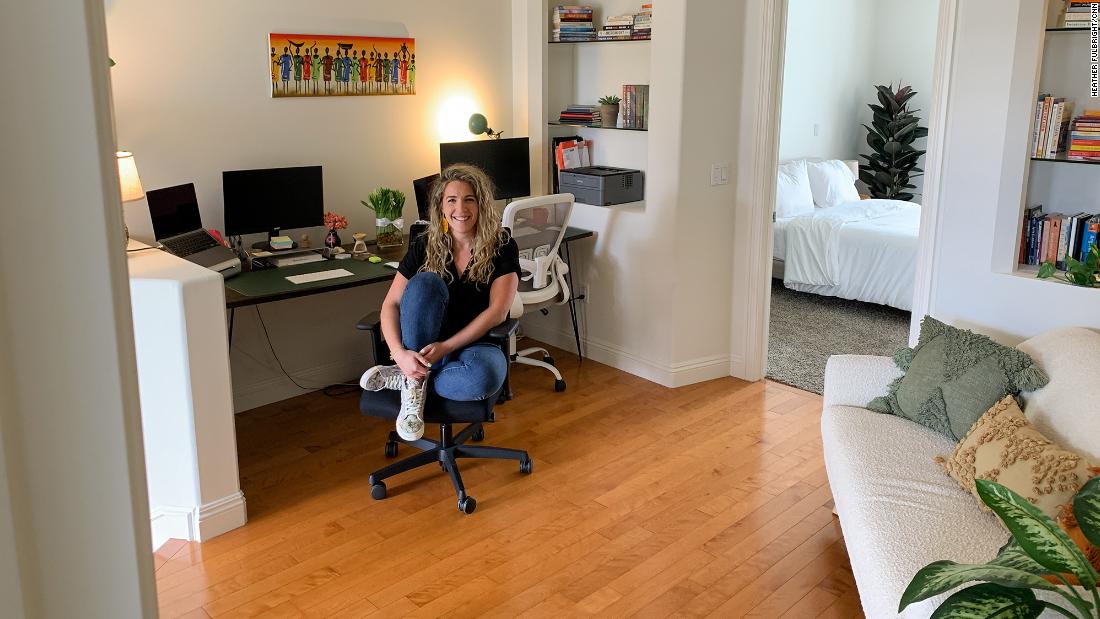
Then last summer, when she happened to be at her brother's house in LA, she got an email from her employer announcing the workforce would be permanently remote.
"Everything clicked in that moment, and I decided to make the move."
She moved out of her Brooklyn apartment and now rents a townhouse with her younger brother in Culver City.
"The lifestyle of New York is amazing, but it also comes with so many difficulties as well. It's such a high fast-paced lifestyle... it can get very intense at times," she said. "And LA has that, in some ways, but because the weather is beautiful all the time and there is nature and people are living a very different lifestyle, the pace is slower. You can choose to be on and intense if you want to, but also choose to sit back and enjoy nature and life."
Finding more space
When his employer announced that staff had the option to permanently work remotely, come into the office or a combination of both, Ryan Mattison headed south to San Diego.
Mattison had been living in the San Francisco Bay Area for more than a decade. At the start of the pandemic, he was living in a three-bedroom apartment with two roommates. But it didn't have the best setup to accommodate three people working remotely.
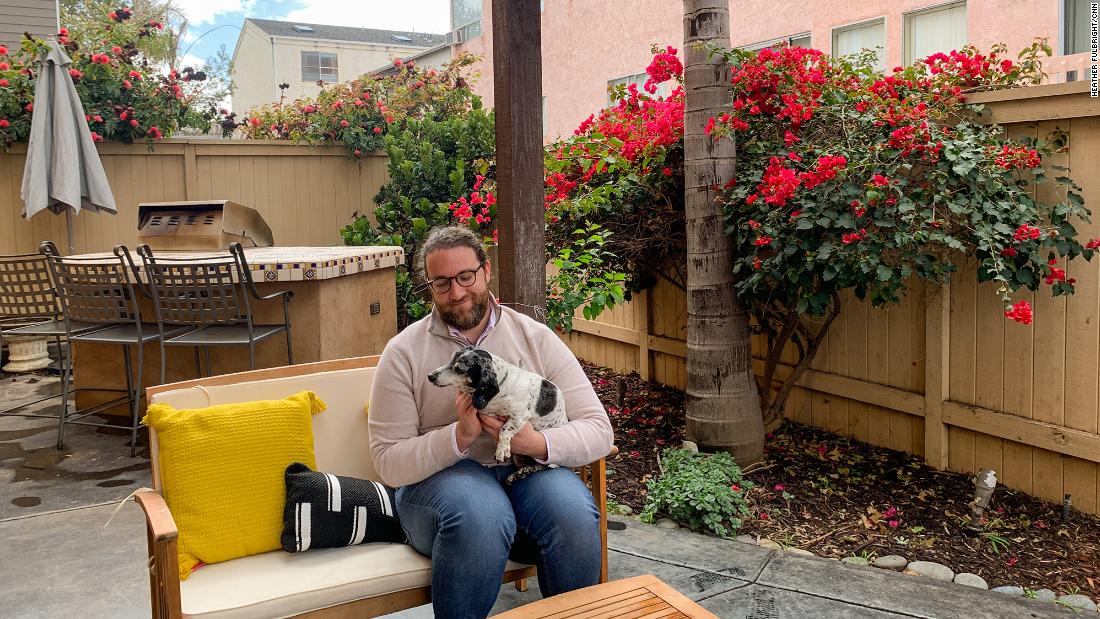
"Getting a desk in all the rooms was not really possible," said Mattison, who is the director of content and communication for ThoughtSpot, a search and AI-driven analytics company. "Someone was always in the living room trying to work during the day which kind of made for a weird dynamic."
He decided to move to San Diego to be closer to family.
"The pandemic really afforded me the opportunity to evaluate whether I can do that much sooner than I originally had anticipated doing."
He and his two roommates bought a three-bedroom, three-bath home at the end of 2020. While house hunting with three people added an extra level of complexity, a top priority was finding a home with enough dedicated workspace.
"I don't have to wear headphones anymore when I am on calls now," he said. And even though he now has more space, his share of the mortgage is about 20% less than his previous rent.
Having a yard has also been a game changer.
"I like outdoor space. I like to be able to grill and lay in a hammock."
When it's safe, he plans to visit the office at least once a month for the day. "It's a 75-minute flight, you can be door-to-door in 2.5 hours," he said. "There isn't a firm expectation...but for my own personal benefit."
Escaping the hustle of the city life
Lauren Makielski had a love-hate relationship with Los Angeles.
"It was amazing to be in a place that had so much going on at one given time," she said. "But I couldn't keep up with the pace everyone was going at."
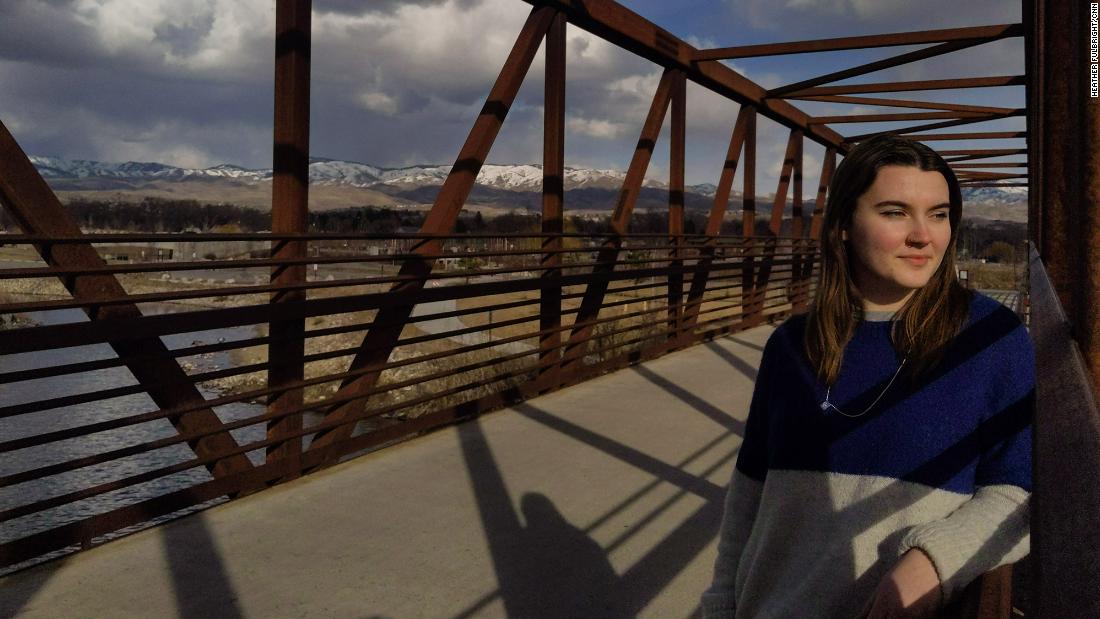
Makielski is chief of staff at marketing firm Hawke Media, where she worked at its offices in West Los Angeles. Before the pandemic, she and her husband, who also works at the company, were already considering relocating to a smaller city.
"But it didn't seem realistic. Our jobs prevailed," she said.
However, when the company announced in July it would remain 100% remote, the couple saw their chance to pack up and move to Boise, Idaho. "After working remote, [my anxiety] decreased significantly, not being in the office environment. And since being here, it has lessened even more. It has been a huge change, and I am really grateful."
The move has also been good financially -- Makielski estimates their expenses have dropped by around $1,500 a month from savings on gas, transportation, food and cooking at home. Their rent is also less expensive -- even though they get more space and amenities.
"Everyone is very outdoor- and nature-focused. It's nice to feel energy in the way people are moving about," Makielski said.
This article was originally published by Kathryn Vasel, edition.cnn.com.




